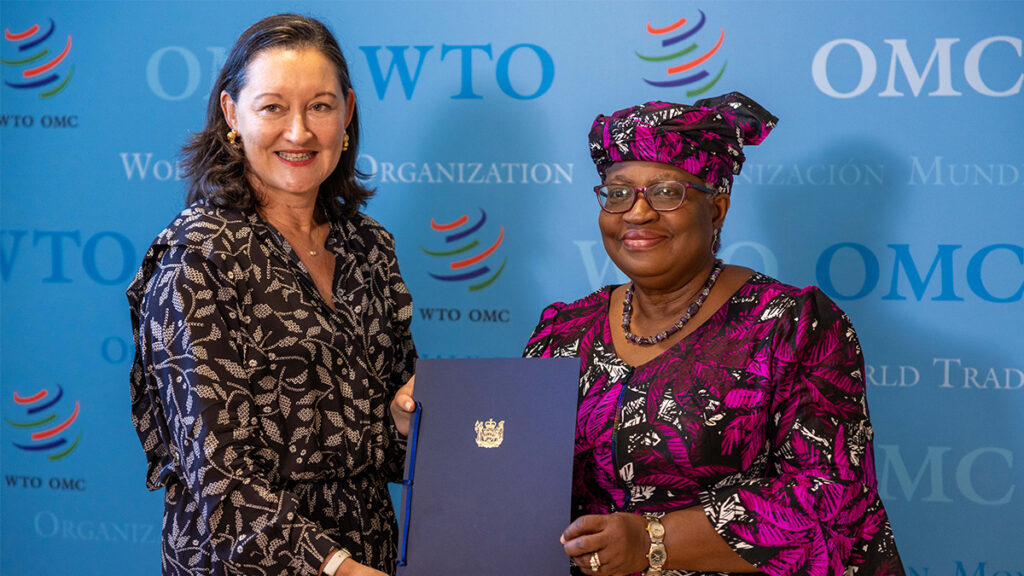Nueva Zelandia acepta formalmente el Acuerdo sobre Subvenciones a la Pesca

Nueva Zelandia acepta formalmente el Acuerdo sobre Subvenciones a la Pesca
Nueva Zelandia depositó su instrumento de aceptación del Acuerdo sobre Subvenciones a la Pesca el 6 de septiembre, por lo que se convierte en el primer país de la región de Oceanía que da este paso. El Sr. Damien O’Connor, Ministro de Comercio y Crecimiento de las Exportaciones, se reunió virtualmente con la Directora General Ngozi Okonjo-Iweala para conmemorar el acontecimiento. La Embajadora Clare Kelly presentó el instrumento de aceptación de Nueva Zelandia en persona. La DG Okonjo-Iweala encomió además a Nueva Zelandia por su contribución por valor de CHF 100.048 al Mecanismo de Financiación para la Pesca de la OMC.
(de momento sólo en inglés)
DG Okonjo-Iweala said: “I am happy to welcome New Zealand into the growing list of WTO members that have formally accepted the Agreement on Fisheries Subsidies. I am also grateful for New Zealand’s donation of CHF 100,048 to the Fisheries Funding Mechanism. These actions add to New Zealand’s important contributions to the WTO’s work to establish global rules against harmful fisheries subsidies. I am hopeful this will encourage more countries in the Oceania region and the rest of the world to formally accept the Agreement, support its implementation, and usher in the speedy entry into force of the WTO’s historic agreement for ocean sustainability.»
Minister O’Connor said: “I am very pleased to deposit New Zealand’s instrument of acceptance for the WTO Agreement on Fisheries Subsidies. This agreement will have a tangible impact on the health of our oceans by prohibiting harmful subsidies to illegal, unreported and unregulated fishing, fishing overfished stocks, and fishing on the unregulated high seas. It shows that trade can and must be part of the solutions to our global sustainability challenges. As Minister-facilitator for the negotiation it was a privilege to support Members in reaching agreement on this landmark deal at MC12, especially given its significance for our Pacific region.”
Including the most recent donation, New Zealand’s total contribution to the various WTO trust funds since 2000 is CHF 1,707,382.
With New Zealand’s instrument of formal acceptance–the 17th instrument received by the WTO–nearly 40% of the acceptances needed for the Agreement to enter into force are now in hand. Acceptances from two-thirds of WTO members are needed for the Agreement to come into effect.
Adopted by consensus at the WTO’s 12th Ministerial Conference (MC12) held in Geneva on 12-17 June 2022, the Agreement on Fisheries Subsidies sets new binding, multilateral rules to curb harmful subsidies, which are a key factor in the widespread depletion of the world’s fish stocks. In addition, the Agreement recognizes the needs of developing and least-developed countries (LDCs) and establishes a fund to provide technical assistance and capacity building to help them implement the obligations.
The Agreement prohibits support for illegal, unreported and unregulated (IUU) fishing, bans support for fishing overfished stocks, and ends subsidies for fishing on the unregulated high seas.
Members also agreed at MC12 to continue negotiations on outstanding issues, with a view to making recommendations by MC13, to be held in February 2024 in Abu Dhabi, United Arab Emirates, for additional provisions that would further enhance the disciplines of the Agreement.
The full text of the Agreement can be accessed here. The list of members that have deposited their instruments of acceptance of the Agreement is available here. Information for members on how to accept the Protocol of Amendment is available here.
WTO Fisheries Funding Mechanism
Because the new Agreement on Fisheries Subsidies will involve adjustments and enhancements to WTO members’ legislative and administrative frameworks, transparency and notification requirements, and fisheries management policies and practices, Article 7 of the Agreement provides for the creation of a funding mechanism to provide targeted technical assistance and capacity building to help developing and least-developed country members with implementation.
The fund is operated by the WTO with partner organizations, namely the Food and Agriculture Organization (FAO) of the United Nations, the International Fund for Agricultural Development, and the World Bank Group, which bring to bear relevant expertise and allow the WTO to leverage its own expertise.
More information on the fund, which became operational on 8 November, is available here.














